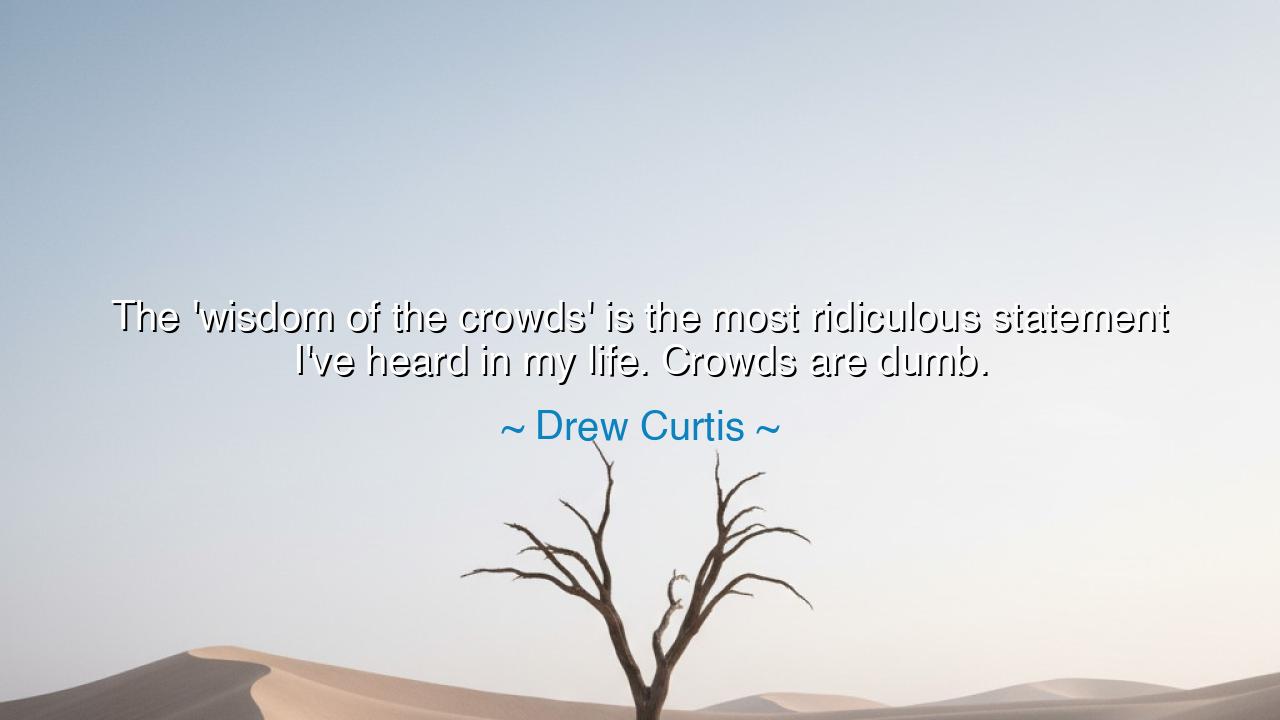
The 'wisdom of the crowds' is the most ridiculous statement I've
The 'wisdom of the crowds' is the most ridiculous statement I've heard in my life. Crowds are dumb.






The sharp-tongued observer Drew Curtis once declared: “The ‘wisdom of the crowds’ is the most ridiculous statement I’ve heard in my life. Crowds are dumb.” In this blunt truth he pierces the veil of illusion that multitude alone breeds wisdom. For while an individual may reason, reflect, and hold himself accountable, a crowd often becomes a beast with many heads and no mind, driven not by reason but by passion, fear, and frenzy.
The origin of this judgment lies in the long history of human assemblies. Time and again, rulers and thinkers saw that the crowd, when gathered, loses its balance, casting aside prudence in favor of impulse. What may be wisdom in a single man becomes folly when shouted by a thousand throats. Curtis, speaking from the age of the internet where voices join in mobs online, reaffirms an ancient suspicion: that collective noise is not the same as collective understanding.
History offers the grim example of the French Revolution’s Reign of Terror. The crowds, stirred by fear and rage, demanded blood, sweeping away reason and moderation. Though many individuals sought liberty and justice, together they became an engine of destruction, condemning thousands to the guillotine. Here is proof that the crowd, left unchecked, is not a fountain of wisdom but a storm of chaos.
The ancients also saw this peril. The Athenians, who prided themselves on democracy, were led by the crowd’s clamor into condemning Socrates, the wisest of their citizens. The Roman mob, swayed by orators, demanded bread and spectacles, selling their liberty for entertainment. Thus the greatest civilizations were undone not by the wisdom of their people, but by the folly of their crowds.
Therefore, O seekers, remember this: do not place your faith in the crowd, for its heart is fickle and its judgment shallow. Seek instead the counsel of the thoughtful, the brave, and the experienced, who stand apart from the mob’s fury. For true wisdom is born not in the noise of multitudes, but in the silence of reflection, in the courage to dissent, and in the discipline to resist. The crowd may roar, but the solitary voice of truth endures long after the multitude has vanished into dust.






DTDuong Tran
I find Drew Curtis' view interesting because it contrasts with the popular idea that groups can often make smarter decisions than individuals. It's hard to deny that crowds sometimes get carried away by emotions or misinformation, but are they really 'dumb,' as Curtis suggests? What do you think? Can a crowd ever demonstrate wisdom, or is the individual always better at thinking critically? How do we strike a balance between individual thought and collective action?
QBduc quyet bang
I think Drew Curtis’ statement brings up a good point, especially when you consider how people often act in large groups—impulsively or irrationally. It makes me wonder: is there ever a time when the 'wisdom of the crowds' works? Can crowds be wise when they’re well-informed and focused, or is the idea of collective wisdom just a comforting illusion? What factors influence whether a crowd can make good decisions?
TTThao Thai
This quote really makes me reconsider the idea of 'wisdom of the crowds.' While it’s often presented as a positive concept, crowds can certainly lead to groupthink or poor decisions when they aren’t critically thinking. But is it always true that crowds are dumb? Maybe, in some situations, crowds can collectively make accurate decisions based on shared knowledge. How do we differentiate between the two, or is there no real middle ground?
AVTran Ai Vy
Drew Curtis' quote challenges the common belief that crowds, when combined, hold great collective wisdom. It’s interesting because, while crowds can sometimes offer valuable insights, they can also become easily manipulated or act impulsively. What’s your take on this? Do you think crowds can ever be truly wise, or are they more likely to follow the loudest voice in the room? Is collective intelligence a myth or just misunderstood?